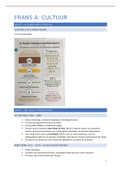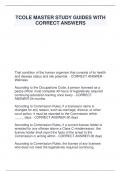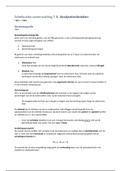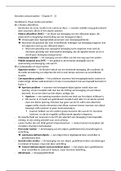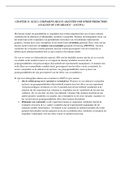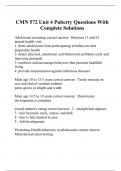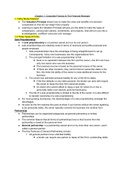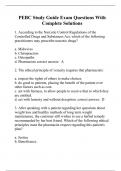Public International Law | LLB International and European Law | Year 2 | Block 2
Lecture 1: Peaceful Settlement of Disputes (and the ICJ)
General Observations
● 2(3) UNC: All states should settle disputes by peaceful means, which is then up to them
– whether its pulling sticks or a lottery system.
● 2(4) UNC: Members of the UN must all refrain from using / threatening use of force in
their international relations (or any other manner).
● Is there an obligation to settle disputes? NO. Many states have disputes they don’t deal
with and haven't dealt with for years, decades or centuries, such as the Falklands /
Malvinas dispute which has been active since the 1830s.
● Dispute settlement between states depends greatly on CONSENT, because without
agreement to have recourse to a specific method of dispute settlement, attempts by
either side may be met with silence or denial.
● Article 33 UNC provides that parties need to seek a peaceful solution (as provided) with
the continuance of any dispute which “is likely to endanger the maintenance of
international peace and security”.
Diplomatic Methods of Dispute Settlement
FIRST: What is a dispute?
● = a disagreement, conflict, situation etc where the parties have clashing interests and
disagreement on FACT or LAW.
● Mavrommatis Palestine Concessions case definition: “disagreement on a point of law
or fact, a conflict of legal views or of interests between two persons.”
● Nuclear disarmament case, 2016: a state brought a dispute against several states with
nukes, claiming there were multiple violations of the nuclear tests treaty.
○ However, the court stated that In order for there to be a disagreement, both
parties to it need to be AWARE a dispute exists! There, thus, need to be explicit
statements / communications that make this clear for both / all parties.
○ Key date of awareness of both parties is up to the point that you submit an ICJ
application that they have a dispute.
○ If not worded precisely and accurately, may not work out in court as you want.
Negotiations
● Where states sit down and discuss the dispute to try to find a solution that everyone is
happy / equally unhappy with.
● Red crusader incident → British fishing ship at farough islands was found by Danish
ship, and the latter tried to inform them they couldn’t fish there. They decided to try to
outrun the Danish ship (a common situation in law of the sea). The Danish ship was
telling them to stop, then a warning shot over the boat, then they started firing at them.
, While conduct in such cases is now resolved in UNCLOS (boarding a ship, etc), at the
time this was not present. These were negotiations.
Good Offices
● Where states in dispute select an individual they trust, such as the UN Secretary
General, to act as an in-between to encourage / initiate direct communications and
negotiations. This is done without the individual taking direct participation in the
discussions.
Mediation
● Where the states to a dispute choose an individual to be a sort of intermediary for the
negotiations. The difference from good offices, however, is that here the mediator is
expected to take a slightly more active role in the discussions by suggesting some
solutions to the problem.
○ Beagle Channel dispute: the Queen of England suggested a decision on how to
resolve an issue between two states that chose her as the mediator. However,
they were completely against the suggestion, and ended up complaining to the
Pope and, ultimately, having him as the mediator.
Conciliation
● Where conciliation commissions are established between the states with the aim of
taking a more legal approach (previous methods were more political, oriented around
easing tension). The commission tries to propose solutions through its considerations of
the law surrounding the dispute.
○ E.g. In law of the sea, maritime delimitation is the usual go-to to solve disputes of
maritime zones. However, the conciliation commission to a dispute proposed
something else — areas of joint development in the sea, where profits and
resources could be shared.
○ Information is everything in negotiation — Australia was tapping the other side’s
negotiators and so figured out what their maximum in negotiations were. This
eliminated the hard part of negotiations: never knowing what the other side is
willing to do. But since Australia was tapping East Timor(?) they knew what their
maximum was, and made that their entire aim; starting there and pushing
onwards.
Legal Means of Dispute Settlement
Arbitration
● Permanent Court of Arbitration (PCA) created in the late 19th century through 8 piece
conferences. It consists of a register of different arbitrators that states can use to create
their own arbitration tribunals.
● However, it is not the only possible arbitral court. States can either:
○ Create own ad hoc tribunal

